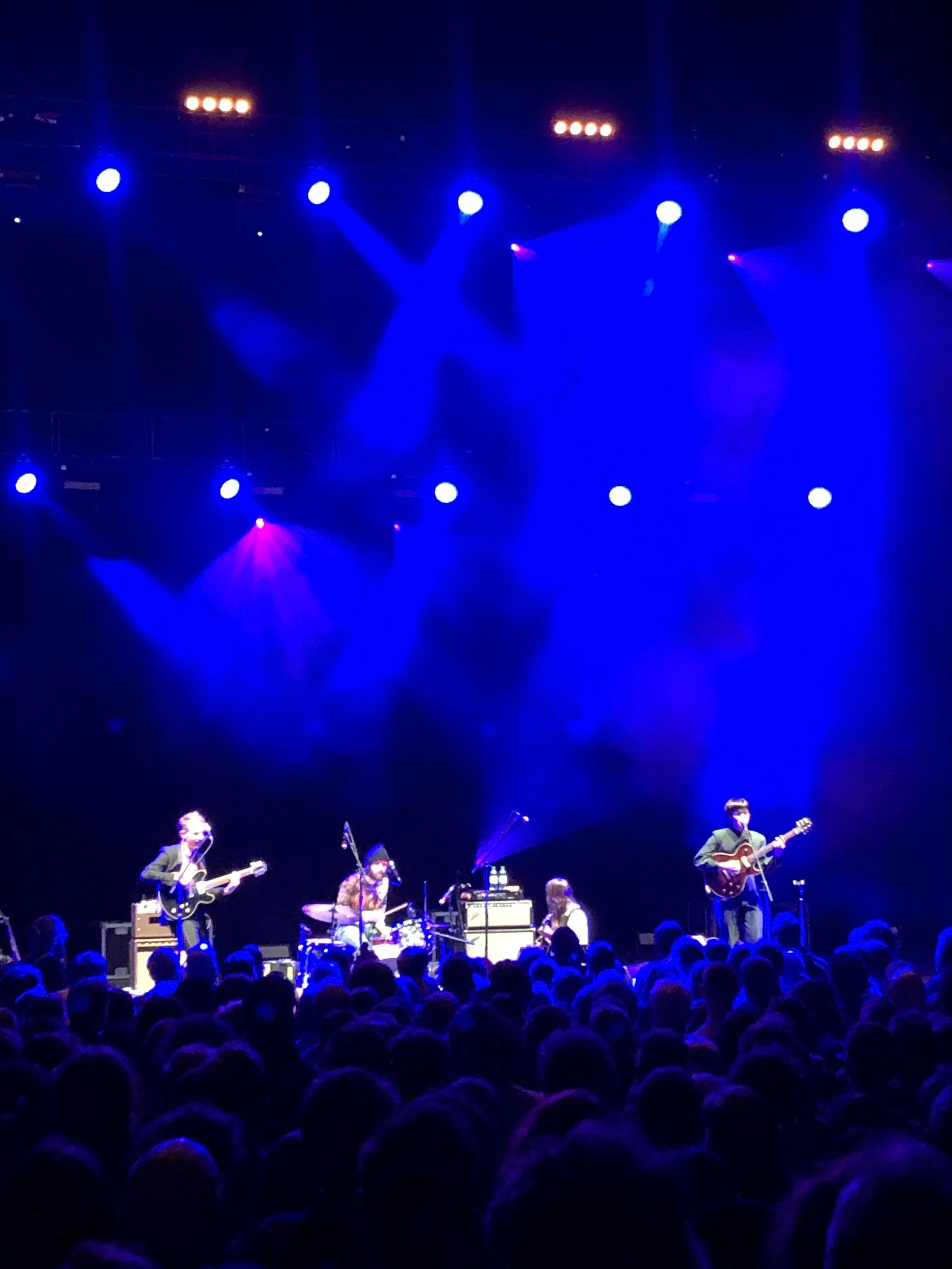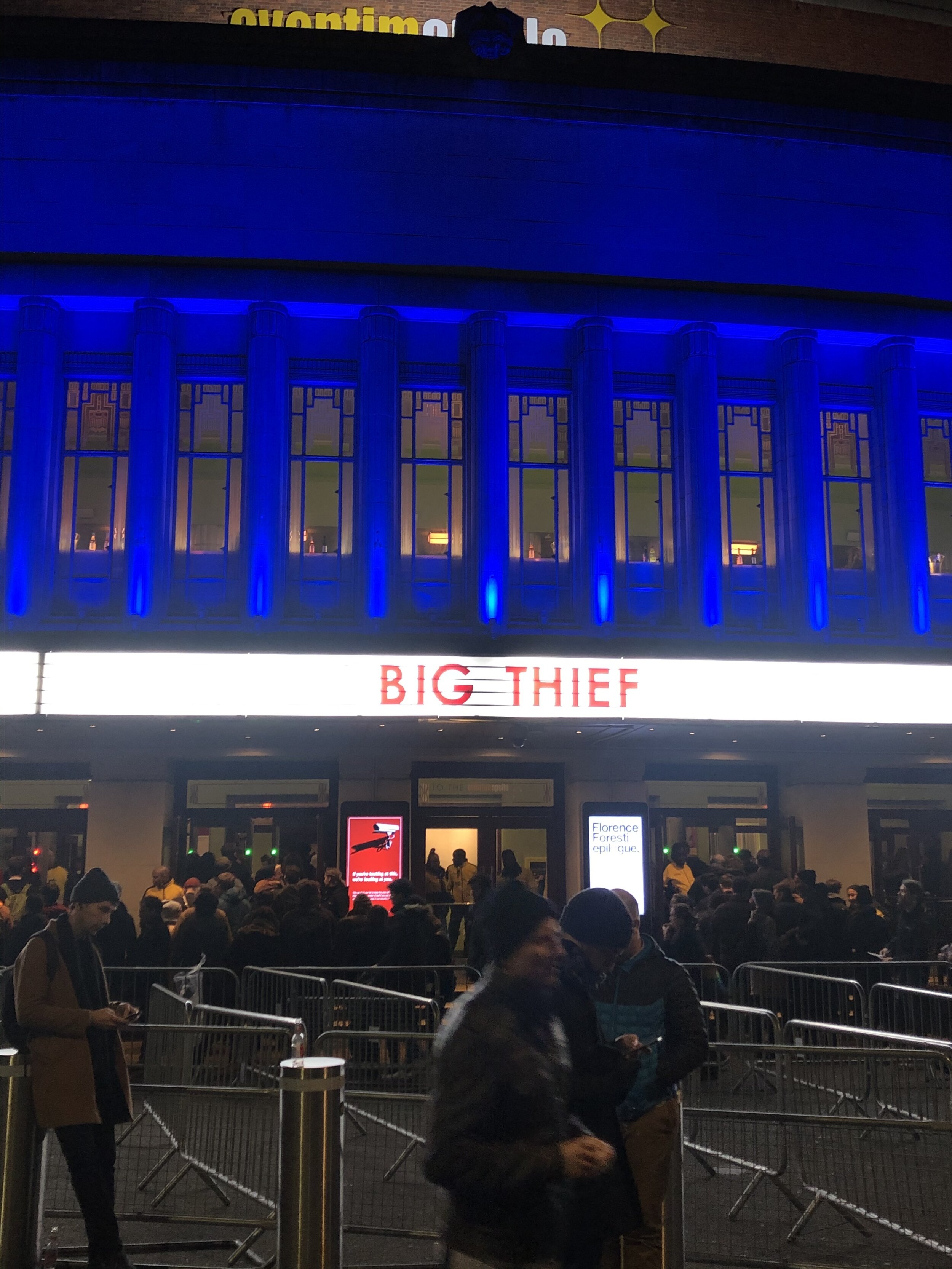Missing a Beat - My Year Without Gigs
February 27 marks a full 365 days since I last went to a gig.
On a chilly February evening, I went to see Big Thief at the Eventim Apollo in Hammersmith and had no idea how momentous that night would later become. Gigs have been a consistent source of joy throughout my life, and I never imagined I’d go a whole year without one.
Every element of that night feels special - even though it felt so normal at the time. Enjoying a pre-drink with my gig buddy and us chatting about what the set list might be. Dropping my coat off in the cloakroom when I arrived, (knowing full well retrieving it would add at least another 20 minutes to the end of the night). Then, walking into the main space, the lights and hubbub, the support act going for it. Waiting at the sticky bar and yelling my order. Then finding my favourite spot (whatever the venue, it always seems to be the front left side). All of that before the band had even started performing.
The gig kicked off and for two hours I was transported somewhere else. I sang the words to all my favourite tunes, danced as much as the space allowed, whooped until my throat complained and, after the encore and they walked off stage, I was elated, slightly knackered and buzzing simultaneously.
The live music industry - along with countless other industries - has been turned upside down by COVID-19. Gigs are the Coronavirus’ dream; hundreds/thousands of people squished together so much that sometimes they can barely move, whilst singing and cheering at the top of their lungs. An entire industry was deemed deadly from March 2020 and for a very long time music had to stop. So, what the hell did the venues do? Put simply, become insanely adaptable.
‘We’ve constantly adjusted, throughout the pandemic, to try and ensure continuity of a live programme.’ says Ed Frith, Head of Live Programme at the De La Warr Pavilion in East Sussex. Thinking on their feet has been the name of the game for music programmers across the UK who have had to constantly plan and re-plan how they can bring music to the masses. Lucy Wood, Head of Music at the Roundhouse in Camden, had only just started her role when the pandemic hit. She thought she would be at multiple gigs a week, meeting with promoters, agents and managers at the venue, but her role changed in an instant. ‘Instead, it’s trying to reach audiences in different ways – streamed shows, IGTV performances, socially distanced activity, workshops and masterclasses delivered entirely online’, Lucy says. ‘Online has been key - experiencing live music virtually has become almost perfectly normal, whereas before the pandemic, it might have been unthinkable for some avid gig-goers. As with venues and their programmers, audiences are having to adapt too.
But it hasn’t all had to be digital. As well as re-crafting live performances for an online audience, some venues were able to do socially distanced gigs when the first lockdown was eased. This was the case for Ed, ‘We have an auditorium and three licensed outdoor spaces. Early in the summer, I drew up a socially distanced plan for all four of those areas. Over the course of the summer, we delivered a series of outdoor comedy shows with our patron, Eddie Izzard and, later in the year, managed to host some socially distanced gigs in the auditorium.’ Although it was clear to Ed that because the capacity of the socially distanced gigs was much smaller, there was no real margin for profit, it still had value in terms of being able to deliver some sort of programme for audiences.
Whilst stepping up and doing everything they can to support their venues, how do they feel the industry as a whole has been supported? ‘The Government has handled the whole pandemic diabolically, and the specific attention - or lack of it - afforded to the live music sector has been unacceptable.’ Ed says. As with the hospitality sector, venues spent a huge amount of time and money trying to make their spaces safe for audiences according to the Government’s guidelines, but, Ed says, they are ‘the first to be closed down and the last to open.’ The lack of direction from the Government has made planning ahead even harder, Lucy says ‘...we need a reopening timeline - something to work towards in order to build more reliable reopening plans.’ Then there’s the freelancers - who make up a huge chunk of the industry’s workforce - who have suffered a great deal through lack of tangible support. Lucy says, ‘We know that many freelancers in our sector have fallen through the cracks and we're at risk of losing incredible talent from the industry - we need to make sure they get support.’ With or without the Government’s support, the industry as a whole has ensured it is being heard. ‘The industry has been great at working together to talk with one voice, through things such as #LetTheMusicPlay and #WeMakeEvents’ says Lucy.
So, what do the future gigs look like? According to Ed, reassuringly familiar (over-the-top air punch from me at this point), ‘In terms of gigs themselves, the future looks very much like it did before March 2020: we’ll go to venues, meet friends and watch great live music.’ But, he reckons, there may be some interesting changes that come from this odd moment in time, ‘A lot of people have experimented with outdoor performances that they might not have had the time or inclination to try, some of that may well stay as a legacy. There’s also the fact that a lot of tours are ‘backlogged’ and we might see bands doing longer tours and using more, regional venues (which could be beneficial to us at De La Warr Pavilion). This may also be exacerbated by the fight bands will have to have, to get in and out of Europe [due to the changes in visa rules]: once bands are in the country, they may well tour for longer.’
Like with everything else during this pandemic, looking ahead is absolutely key. Focusing on being able to get back to doing what we love, and what makes us feel like, well, us again is so important. For me, seeing live music has undoubtedly been one of the things I’ve missed the most, and what I am ludicrously excited about doing again. I am not alone in that excitement, which is another vital thing to remember; gigs are an incredible group experience. As Lucy puts it, ‘At the core of it is our enduring desire as humans to come together to experience live music collectively. We’ve been doing that for centuries and we’ll find ways to keep doing it for centuries more.’
So, there you have it. Not sure where or when but we will once again connect with our favourite artists and the people around us, clutching our pints and singing along. We’ll enjoy every nano second of it and when they walk off stage at the end of their set, we’ll scream for an encore louder than we ever have before.
Written by Charlotte Livingstone
Charlotte is a music obsessed south Londoner who loves dancing, crosswords, The Chase (too much) and getting out and about. She writes for a living as a Digital Content Editor and is loving being able to write for fun with The Everyday.



